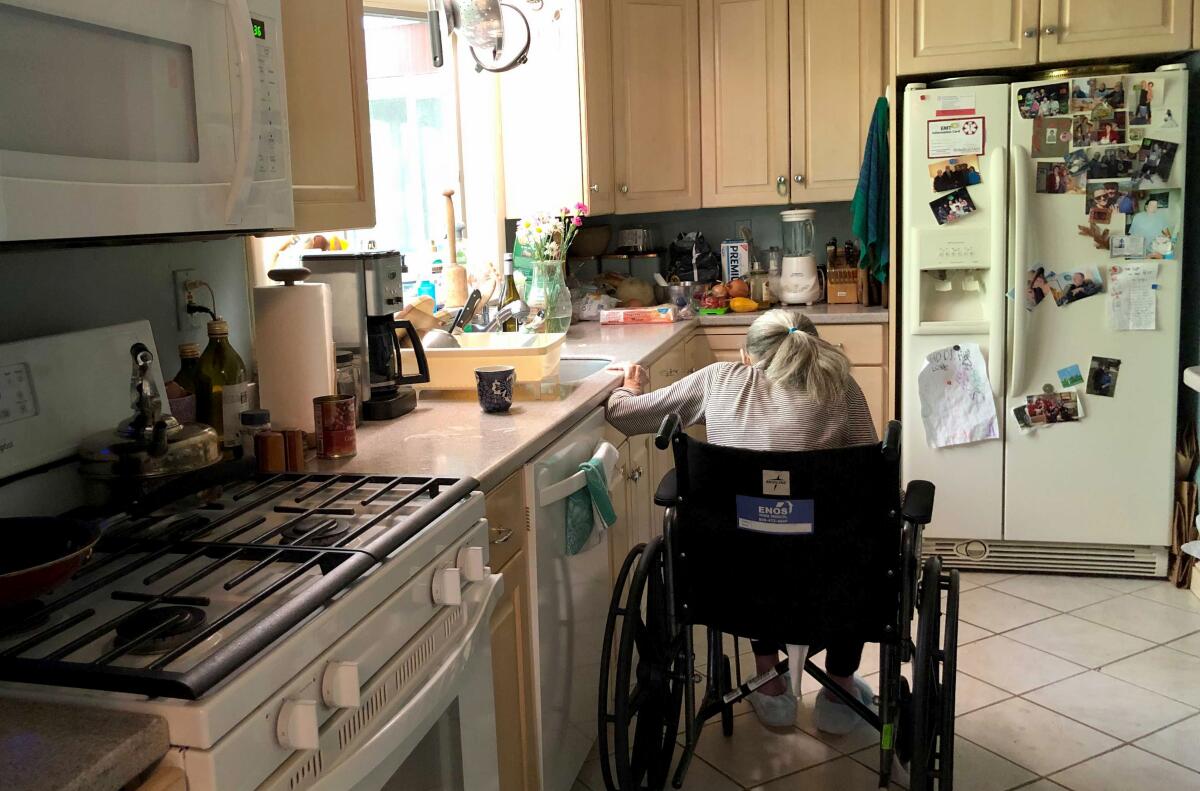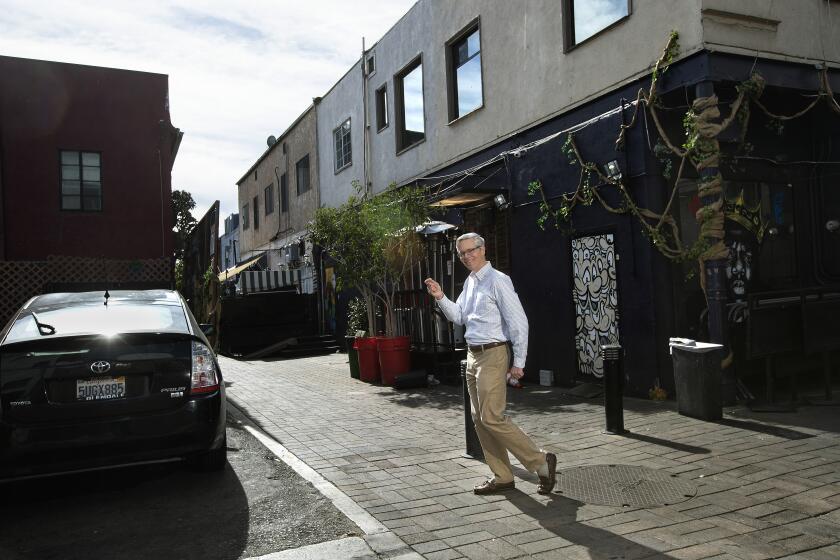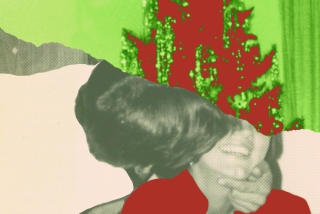What are the costs of the lost pandemic year? They hit me hard when I finally visited my mother-in-law

- Share via
For three decades, I knew my mother-in-law as a strong woman with very sharp edges. She was highly opinionated and blunt — sometimes excessively so. Her words could bruise if you let them.
She rarely paused to edit her thoughts.
If she didn’t like the service she was getting at a restaurant, she’d say so in a stage whisper that projected several tables over, which many times made me cringe in embarrassment.
She’d tell you right away if she thought you’d gained a few too many pounds. She let her disdain for stupidity be known. She once told my husband, her baby son, that he and his two older brothers were [insert expletive, plural] when she found out they’d made no plans to fete their father on Father’s Day.
She also was a voracious reader, deeply engaged with her community, deeply interested in the world, funny, whip smart, passionate, loyal and capable of great kindness.
Even though she lacked the natural softness of my own mother, after I lost my mother 17 years ago this week, she took to cuddling me and never let go. Already close, we grew far closer. We’d snuggle up on her bed — as she, my husband and I did, weeping and telling stories, on the night my father-in-law died two years ago — and settle in for long heart-to-hearts. She let me lecture her about her verbal jabs and — at least for a day or two after — she tried hard to keep her promises to tame them.
Now her sharp edges are physical. She is skin and bones. She is tiny. To hold her is to fear you might snap her. You can see and feel every bump in her spine.
I know this because three weeks ago, I wrapped my arms around her for the first time in well over a year — finally able to go see her without risking her life.
And when in doing so I found so much less of her, the cost of our lengthy enforced separation hit me hard.
This is just one small, personal story of loss. We all have them. My mother-in-law and I remain on this Earth. We are lucky.
The pandemic, of course, stole so much more from so many.
But it took away her wider world and her independence — and our chance to reunite again in real conversation.
These days, my mother-in-law speaks very little. She struggles to find words. She starts a thought and loses it. “I really think ...,” she says before silence sets in. “I just remembered,” she offers, and then the delicate thread breaks.
Before the pandemic, my mother-in-law was successfully living alone in her 90s. Alone, she negotiated the many steps in her split-level home in the suburbs of Boston. She cooked for herself. She went to yoga class. She read, kept up with politics, watched endless hours of news and fell asleep each night to a sound she found soothing: Rachel Maddow skewering the Trump administration.
My mother-in-law railed against all things Trump. He filled her with outrage. She expressed it with characteristic gusto.
Then one day in late March 2020, she felt a sharp pain in her chest and struggled to breathe. Her oldest son raced over. She was whisked by ambulance to a hospital in Boston, just as the pandemic first pummeled that city.
She’d had an aortic dissection. The lining of the main artery carrying blood away from her heart had torn, which is life threatening. She was hurting, but more than that, she felt all alone and terrified.
Because of the pandemic, no one in the family could visit her. The nurses and doctors taking care of her were strangers. They also were scarily suited up, faces hidden by masks.
Offered the chance to undergo surgery that could repaired the blood vessel, she firmly said no. She told us on her nurse’s cellphone that she just wanted to get the hell out of there and go home.
Soon, also because of the pandemic, having that surgery was no longer an option.
Neither was hiring professional help for her at home. And so, for more than a year, the family members who live near her took turns staying with her and caring for her around the clock. My two brothers-in-law alternated night shifts. My nephew was there most days. My niece, who lives in New Hampshire, came when she could. My sisters-in-law did their part. All the while, while they were masked and careful, there was no guarantee that my mother-in-law would stay safe.
In an unnamed and unheralded alley just south of Hollywood Boulevard, Charlie Chaplin, Harold Lloyd and Buster Keaton filmed scenes in some of their greatest films. It deserves recognition.
That she did not get the virus, that she is still with us, sometimes feels like a miracle. But at the same time, in her mostly solitary confinement, so much of who she was bit by bit fell away.
She’s growing weaker. She can no longer stand on her own. She has to be lifted out of bed and onto the commode and into a recliner in the living room. She has to be pushed up and down all those split-level stairs in a wheelchair. She’s in a hospital bed with railings so she won’t try to get out, fall and hurt herself. She’s in adult diapers. She can no longer brush her teeth, cut her food, change her clothes or keep clean without help.
She no longer knows or cares what is happening outside her front door. For her, politics have gone poof along with her prodigious memory, which until recently held countless great stories and details dating to her early childhood. In her living room, we set up a FaceTime call with a friend of hers from middle school — but as the friend reminisced, my mother-in-law sat hunched forward, looking down at her lap, her hands plucking at her pants. She often folds herself in that way now, her personal space snail small.
It’s not that she’s not there. I still think her brain has a certain sharpness to it. She loves music. She used to burst into song at the slightest prompt. You’d say it looked like there might be a storm and she’d start singing “Stormy Weather.”
So day after day, she and I sat side by side watching operas and musicals on an iPad. Occasionally, if I coaxed her into it, she’d sing along for a handful of words: “We’re off to see the wizard,” or “... just singing in the rain.” And she seemed to follow the stories in the moment.
But if I talked about what we’d just seen an hour later, she’d already let it fall by the wayside.
My husband, who has taken a leave of absence from his job to be with her, describes her state well: She no longer lives in any past or future, just the present.
And so, in my visit with her, I tried to make that present happy — to make her laugh, to feed her delicious home-cooked meals, to spear the berries in her fruit salad for her, to sit by her side and hold her hand and tell her I loved her. I hope I’ll get to go back soon and do more of that.
But I can’t go back to the time before, though I’m watching dormant elements of it reemerge everywhere.
Both my cross-country flights were sold out. Masks were required but often not on — since snacks and drinks were being served. Pandemic patience seemed to have disappeared. It was as if we’d never had any. People pushed and shoved to get off the planes long before it was time for their rows to empty. Those in the back stowed their carry-ons in the front. It all felt chaotic and too crowded and close.
We’ll get that small stuff back, some of it bad, some of it great.
But so much of what we’ve lost is much bigger and no longer retrievable.
More to Read
Sign up for Essential California
The most important California stories and recommendations in your inbox every morning.
You may occasionally receive promotional content from the Los Angeles Times.















